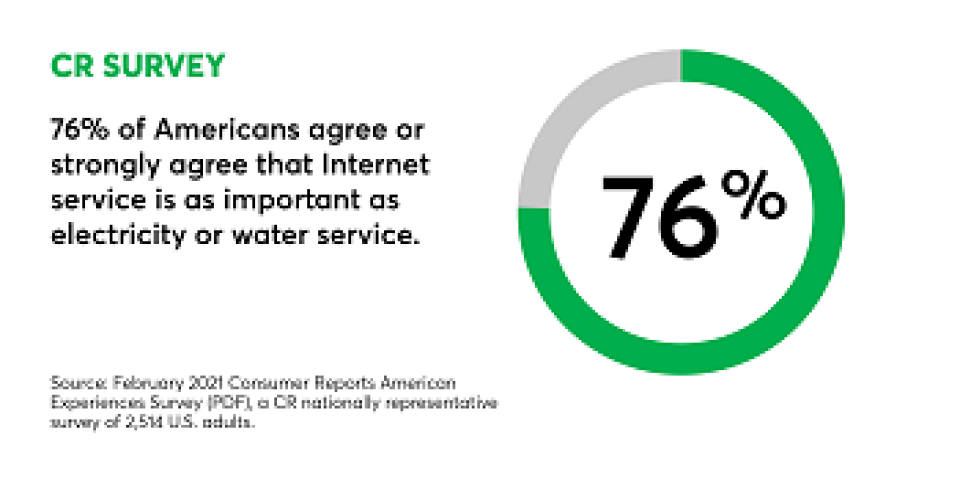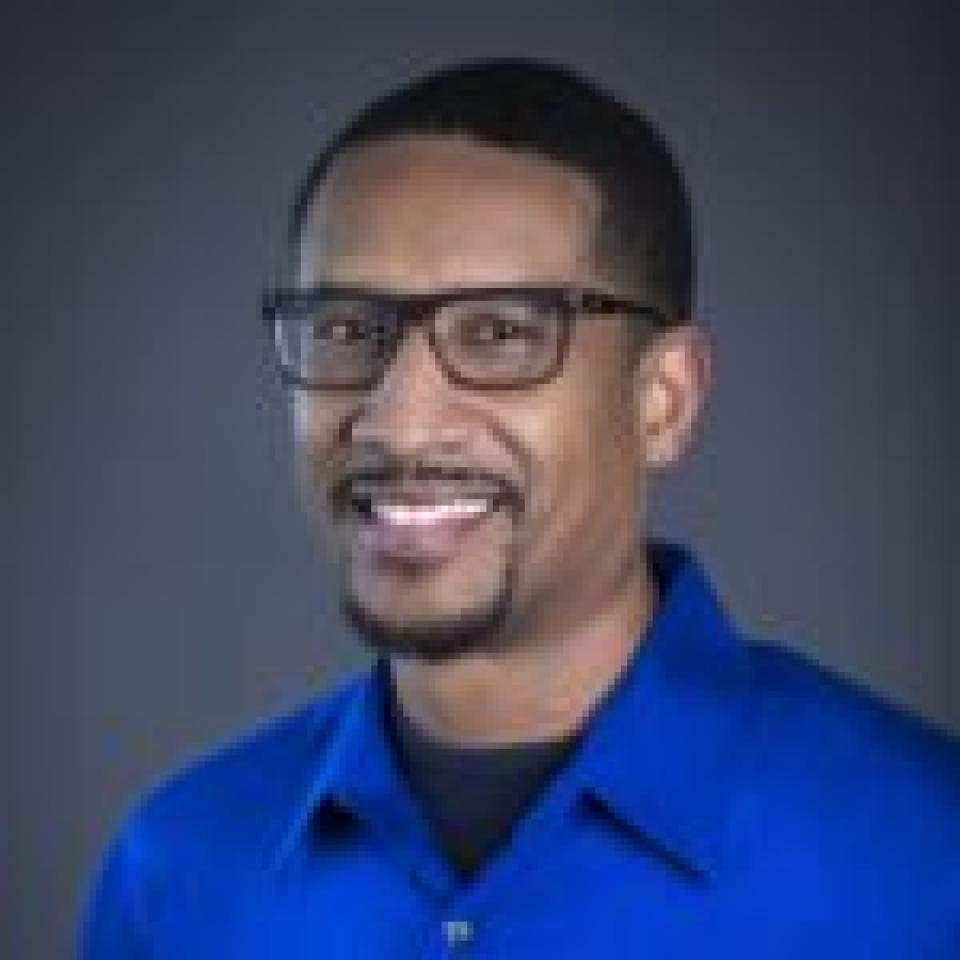
Fast, affordable Internet access for all.

Internet access in the United States is among the most expensive in the world, both in terms of absolute prices and in cost-per-megabit. Millions of families around the country can't afford to get online, making them even more disconnected from social services, family, and friends, more economically vulnerable, increasingly bearing the burden of the homework gap, and less healthy.
All of this is a direct result of the broken broadband marketplace, dominated by just a few monopoly providers regularly raising prices to extract wealth from communities. It's also the result of an FCC which has consistently refused to mandate the submission of pricing data from Internet Service Providers (ISPs), or collect it from users themselves. Instead of investing in infrastructure upgrades or innovating, huge providers like Charter Spectrum, AT&T, Comcast, and Suddenlink have sunk time and energy into making our broadband bills harder to interpret, all while raising prices, changing plan terms, and playing around with data caps to pad their profits.

Let's change that, together.
The Institute for Local Self-Reliance is joining with Consumer Reports to collect bills from 30,000 households across diverse geographic and demographic backgrounds in an initiative called Let's Broadband Together.
ILSR is thrilled to welcome a collection of new faces to the Community Broadband Networks initiative team, bringing with them new energy and thoughtfulness which will continue to invigorate our work.
Dozmen Lee a political science major from Iowa State University who brings experience in grassroots organizations and helping build power for communities facing income disparities and adverse outcomes for youth populations. Doz joins us on a full-time basis as the new Outreach Coordinator, helping communities and local leaders at all stages considering investment in Internet infrastructure.
Ibrahim Ahmed is a Community Broadband Networks intern for the Institute for Local Self-Reliance. He is a fourth-year undergraduate student at the University of Southern California studying politics, philosophy, and law. He is interested in the intersection between political, economic, and social inequalities and how they affect access to broadband. Ibrahim is also the author of the forthcoming book, "Uniting the Divided States of America," set to be published by New Degree Press in December 2021.
Emma Gautier is a Community Broadband Networks intern for the Institute for Local Self-Reliance. She supports data collection and analysis within the broadband initiative. Emma recently received a BA in Women’s and Gender Studies from Carleton College, and since graduation has been working in research, advocacy and political organizing for social and environmental justice. She is interested in the synthesis of research and on-the-ground action in communities.
Ethan Winter is a graduate student in Public Policy and Management at Carnegie Mellon University (CMU) and a Community Broadband Networks Intern with ILSR. He enjoys using data to fight against monopolists and advocate for local power. Prior to ILSR, Ethan graduated with a BA in Managerial Economics from Allegheny College. While off work, he brews beer and mead.
The Institute for Local Self-Reliance (ILSR) is a national nonprofit working to empower communities by striking at the roots of monopoly power and striving toward a vision of thriving, diverse, equitable communities. We use in-depth research, reporting, and data analysis to produce influential reports and articles. Our analyses are frequently featured in national news media and sought out by policymakers. We work closely with a broad range of local community leaders, elected officials, and a diverse coalition of allies to advance these ideas and policies.
Community Broadband Organizer
ILSR is looking for an enthusiastic candidate to assist these local organizing efforts. Our Community Broadband Networks program has many resources and contacts that can dramatically accelerate local organizing efforts. This position will require frequent meetings with local groups to understand their goals and challenges, as well as organizing more general support systems like mutual-aid calls and other resources as needed. Success will mean many more communities will achieve digital equity more rapidly than would otherwise occur.
Responsibilities
A Successful Candidate
The Institute for Local Self-Reliance (ILSR) is pleased to announce that it has been selected by the American Council of Learned Societies (ACLS) as a host organization for two Leading Edge Fellowships, which demonstrates the potential of humanistic knowledge and methods to solve problems, build capacity, and advance justice and equity in society. Leading Edge Fellowships place recent humanities PhDs with nonprofit organizations committed to promoting social justice in their communities.
In Fall 2021, the program will place up to 41 recent PhDs to work on projects at partnering organizations. Fellows receive an annual stipend of $60,000, as well as health insurance and professional development funding. Fellows lead substantive projects that draw on the skills and capacities honed in the course of earning the humanities PhD, including advanced communication, research, project management, and creative problem solving. This initiative is made possible through the support of The Andrew W. Mellon Foundation.
Applications are due May 6, 2021 (9pm EDT). For more information, visit https://www.acls.org/Competitions-and-Deadlines/Leading-Edge-Fellowships
ILSR will host two fellowship positions:
PROJECT 1
In 2020 the Institute for Local Self-Reliance’s Community Broadband Networks Initiative said sad goodbyes to Lisa Gonzalez and Katie Kienbaum, but we have three new thoughtful and talented people joining us.
Sean Gonsalves, Senior Reporter, Editor and Researcher

Sean Gonsalves is a longtime former reporter, columnist, and news editor with the Cape Cod Times. He is also a former nationally syndicated columnist in 22 newspapers, including the Oakland Tribune, Kansas City Star and Seattle Post-Intelligencer. His work has also appeared in the Boston Globe, USA Today, the Washington Post and the International Herald-Tribune. An award-winning newspaper reporter and columnist, Sean also has extensive experience in both television and radio. Sean has made appearances on WGBH’s “Greater Boston” TV show with Emily Rooney and was a frequent guest on New England Cable News (NECN), commentating on a variety of Cape Cod tourist attractions as well as making regular appearances on WCAI's weekly news round-up broadcast, "The Point with Mindy Todd."
He left print journalism in 2014 to work as a Senior Communication Consultant for Regan Communications and Pierce-Cote, advising a variety of business, non-profit and government agency clients on communication strategy. In October 2020, Sean joined the Institute for Local Self-Reliance staff as a Senior Reporter, Editor and Researcher.
Reach Sean by email at sgonsalves@ilsr.org
We’ve been having a lot of conversations with cities and communities recently looking for solutions to bridging the digital divide. If you’re new to the broadband space and looking for guidance on short- and long-term results, here’s a good place to start. Christopher joined the Michigan Moonshot's Community Education series recently with a presentation titled “A Community Guide to Solving the Digital Divide.”
It breaks down in an accessible way the key concepts, options, and costs to consider. Communities across the country face an array of situations in bridging the broadband gap, including city size, the scope of the problem, available infrastructure, existing ally organizations, and funding avenues.
Christopher covers all of these, as well as inventorying local resources and talent, energizing community officials, and how important it is to define success early on in the process.
His presentation also includes as examples a lot of the gap-network successes we’ve seen over the last year, including San Rafael, California, Providence, Rhode Island, Pittsburgh, Pennsylvania, and Tucson, Arizona. Read about those stories to learn more about the goals set, challenges faced, and successes by local officials, nonprofit leaders, and residents in those cities.
Watch the webinar below, and be sure to stay tuned for the questions at the end.
The Institute for Local Self-Reliance (ILSR) is a national nonprofit working to empower communities by striking at the roots of monopoly power. We use in-depth research, reporting, and data analysis to work with communities as well as produce influential reports and articles. Our analyses are frequently featured in national news media and sought out by policymakers. We work closely with a broad range of allies to move these ideas and policies.
ILSR is looking for a Broadband Writer/Researcher within the U.S. to join a growing team within ILSR focused on ensuring all Americans have fast, affordable, and reliable Internet access. This person will work with Sean Gonsalves and Ry Marcattilio-McCracken to develop research as well as create short- and long-form content focused on improving Internet access both in urban and rural areas. This might seem like a dry and technical issue, but it is a vibrant and exciting field that is also one of this generation’s biggest equity and justice challenges.
Check out the job duties and skills needed below.
Job responsibilities include:
A successful candidate is:
H. Trostle (they/them) is a project manager on the Community Broadband Networks team. They have a Master's in Urban and Environmental Planning from Arizona State University and a B.A. in Political Science and Classical Languages from Macalester College. At Arizona State University, Trostle focused on Indigenous Planning: their final applied project was for the Office of Navajo Government Development. Between degree programs, Trostle worked on the Community Broadband Networks team as a researcher from 2015 to 2018. Trostle is a citizen of the Cherokee Nation and grew up in a small town in northern Minnesota. They are especially interested in infrastructure issues and community development in rural areas.
Connect with them at htrostle [at] ilsr [dot] org.
The Institute for Local Self-Reliance (ILSR) is looking for a Broadband Writer/Editor to join a small team within ILSR focused on ensuring all Americans have fast, affordable, and reliable Internet access.
With Katie leaving to add her acumen, insight, and research skills to ILSR's Energy Democracy team across the virtual hall, there's a signifcant void to fill. Coverage of electric cooperatives here might never recover, and we'll certainly miss her.
Check out the job duties and skills needed below.
Job responsibilities include:
A successful candidate is:
Preferred qualifications:
With the end of the federal Keep Americans Connected pledge and the failure of Congress to pass comprehensive broadband aid, it’s clearer than ever before that local governments are the last line of defense against the digital divide, which has been exacerbated by the ongoing pandemic.
Some communities have already taken steps to connect their residents, during the global health crisis and beyond. For example, the public school systems in San Francisco and Portland, Oregon, decided to cover the cost of broadband subscriptions for low-income students. In Chattanooga, Tennessee, the city’s municipal broadband network is partnering with local schools to provide free Internet access to all students that receive free and reduced-price lunch.
However, in 21 states, legal barriers — often enacted at the behest of corporate telecom lobbyists — prevent local governments from investing in community broadband solutions to close the digital divide.
To help local governments that want to improve connectivity navigate the various opportunities and obstacles, we at the Community Broadband Networks initiative at the Institute for Local Self-Reliance (ILSR) have teamed up with the Local Solutions Support Center (LSSC) to produce a number of helpful resources. We previously shared a step-by-step guide for establishing local broadband authority during the pandemic. Now, local officials and community advocates can access two more resources: a guide for local governments to act in the context of the pandemic, and an interactive state broadband preemption map.